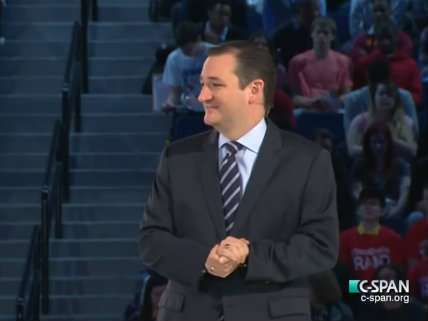5 Things to Know About Ted Cruz's Run for President

Sen. Ted Cruz (R-Texas) just announced that he's running for president at a speech at Liberty University in Lynchburg, Virginia. He's the first candidate to make the announcement official in the 2016 cycle. Here are five things to know about Cruz and his candidacy.
1. He wanted to be the first candidate to announce because he thought it would bring him attention. Being first out of the gate, his campaign hopes, will catch the eye of both high-engagement Republican primary voters and the media—and, in the process, might slow or stop Gov. Scott Walker's rapid rise. Via The New York Times:
By becoming the first candidate to declare himself officially in the race, Republicans briefed on his strategy said, Mr. Cruz hopes to reclaim the affection and attention of those on the party's right wing who have begun eyeing other contenders, particularly Gov. Scott Walker of Wisconsin.
"It's the shiny object principle. He wants to be first, get in the conversation, not show any doubt or hesitation," said Dave Carney, a longtime Republican strategist. "There's an advantage to being first. He's now the only one running for president, instead of engaging in this Kabuki dance that the others are."
Of course there's always a danger to being first, too, which is that by the time the big scrum gets going, you're old news.
2. He's targeting tea party conservatives first, social conservatives and libertarians second. A Houston Chronicle report over the weekend sketched out the basic strategy: "Cruz will vie for the support of the tea party electorate, his advisers say, but will fare well enough with social conservative and libertarian voters to assemble a powerful coalition." The content of the speech, which leaned heavily on Cruz's personal faith, and the location of the announcement, at a prominent evangelical college founded by the late Jerry Falwell, make me wonder if perhaps he's targeting social cons as much as tea party types—leaving libertarians a distant, lonely second.
3. He's loved and adored by the GOP's conservative base. As Ben Domenech writes in this morning's Transom newsletter:
Ted Cruz matches up with the activist base better than any other significant candidate in a long time. I don't think people outside of that base really understand how powerful Cruz's appeal is to the populist energized conservative voter, which is of course just a faction of the right, but is a sizable faction. Cruz's critics need to hope that he is limited to this faction, and incapable of appealing outside of it. But that may not prove to be the case, particularly if Cruz is able to cut into the appeal of, say, Walker for pro-business types, Huckabee for social conservatives, Paul for libertarianish Republicans and the like. And he doesn't just match up with them on policy, he matches up with their brashness, their yearning for someone who loves the taste of blood in his mouth.
I can vouch for this. I saw Cruz's speech at the Conservative Political Action Conference a few weeks ago, and the crowd ate it up. He was speaking their language; it was a rock-concert-like mind-meld between speaker and audience. Cruz really connects with these folks, and, perhaps just as importantly, he doesn't embarass them like some other base-friendly candidates in years past.
4. Cruz is running on a flat tax. He hasn't offered a whole lot of details, but he's said repeatedly that he wants to abolish the Internal Revenue Service entirely. And in today's speech, he touted the idea using a familiar pitch, saying his goal would be to "let every American fill out his or her taxes on a postcard."
5. Cruz is adamantly against ethanol cronyism—even in Iowa. Cruz has pushed a bill to repeal the Renewable Fuel Standard, and, as Politico's Morning Energy notes, he stood his ground against the RFS in a recent trip to Iowa.
Cruz has co-sponsored legislation that would repeal the Renewable Fuel Standard over a period of five years, and when he spoke at an agriculture summit in RFS-loving Iowa earlier this month, he stuck to his guns. "The answer you'd like me to give is 'I'm for the RFS, darn it,'" Cruz responded to Bruce Rastetter, the agribusiness mogul who organized the summit. "That'd be the easy thing to do. But people are pretty fed up with politicians that run around and tell one group one thing and tell another group another thing. Then they go to Washington and don't do anything they said they would do."
That's a real contrast to Scott Walker, who flip-flopped on the issue at a recent Iowa stop. Indeed, Cruz's clear stance against the federal ethanol mandate makes him somewhat rare in the GOP field.


Show Comments (309)